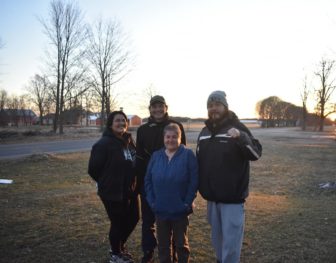An indigenous group marched to the Capitol this weekend to protest Enbridge’s Line 5. Starting from Mackinaw City, they have walked more than 300 miles in 30 days to draw attention to the oil pipeline.
Sarah Jo Shomin with Cody Bigjohn Jr., Nancy Gallardo and LJ Denemy began walking on Feb. 25. The group planned to in Lansing Friday and intended to walk from Adado Riverfront Park to the Capitol on Saturday.
“We believe the land doesn’t belong to us, we belong to the land,” said Bigjohn, 42. “There has been and continues to be, multiple pipeline breaks. The spills are causing irreversible damage to Mother Earth.”

Cody Bigjohn Jr.
(left to right) Shomin with Kenwabikise, Gallard, and Bigjohn on Day 29
For Bigjohn, his favorite part of the march was walking a few miles with his daughter in Traverse City. He said their walk has been very challenging. The first few days were the hardest.
“Our minds and spirits were ready but our bodies were not,” Bigjohn said. “It took a week or so before we got adjusted to walking several miles a day. But it’s been a blessing to be able to walk and connect with nature.”
According to Denemy, a member from almost every federally recognized tribe in Michigan has joined them for parts of the walk. Many families offered meals and housing in different cities during their journey.
“We live in a Great Lakes state, yet we have several pressing water issues. For native people, this is a multi-layered struggle,” Denemy said. “I cried as we walked, thankful for the opportunity to walk with others for the sake of water and our future generations.”

Cody Bigjohn Jr.
LJ Denemy and Justin Kenwabikise walking on Day 20.
Denemy brought his cousin Justin Kenwabikise, 26, a Northwestern Michigan College student to join the walk this week during his spring break. Kenwabikise said he has enjoyed raising awareness for water rights and how pipelines could destroy many industries.
“I own and operate a fish market on Beaver Island,” Kenwabikise said. “If the pipeline breaks, it would ruin everything I’ve been working for the last five years. I would like the governor to speak with us and to seriously consider how this project is damaging drinking water and harming life.”
Enbridge’s communications strategist, Ryan Duffy said the Line 5 tunnel project is an investment and it will make a safe pipeline even safer. Multiple layers of protection that come with placing the pipeline in a tunnel with foot-thick concrete walls, make the chances of a leak virtually zero, he said.
“Line 5 is [an] important infrastructure,” Duffy said. “It is pivotal to the quality of life in Michigan and to the state’s economy. It is a critical element as it ensures safe transportation of 80 percent of Michigan-produced crude oil and natural gas liquids.”
Gov. Gretchen Whitmer told state departments Thursday to stop any work related to the project. Hr executive order followed a ruling by Michigan Attorney General Dana Nessel that the Mackinac Straits Corridor Authority Act was passed unconstitutionally. Nessel said provisions of the law, passed in a lame duck session in December, go beyond what is disclosed in the law’s title.
Both Nessel and Whitmer, released statements on Thursday. Nessel said that any court determination that Act 359 is unconstitutional would likely apply retroactively, and concluded that the authority, its board, and any action taken by the board are void from their inception.
“I agree with the conclusion reached by Attorney General Nessel,” Whitmer said in her immediate release. “The Great Lakes are our most precious resource in Michigan, and because of their significance, I’ve instructed state departments and agencies to halt any actions in furtherance of this law.”











